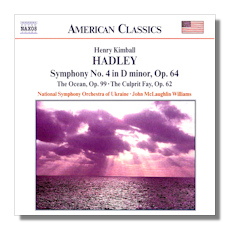
The Internet's Premier Classical Music Source
Related Links
- Hadley Reviews
- Latest Reviews
- More Reviews
-
By Composer
-
Collections
DVD & Blu-ray
Books
Concert Reviews
Articles/Interviews
Software
Audio
Search Amazon
Recommended Links
Site News
 CD Review
CD Review
Henry Kimball Hadley

- Symphony #4
- Tone Poem "The Ocean"
- Symphonic Rhapsody "The Culprit Fay"
National Symphony Orchestra of Ukraine/John McLaughlin Williams
Naxos 8.559064 DDD 68:39
Admirers of exuberant, late Romantic orchestral scores should direct themselves to this CD without delay. These world première recordings make a grand case for a revival of the music of Henry Kimball Hadley (1871-1937).
Hadley, like John Alden Carpenter, is an important figure in American classical music who got lost in the relentless onslaught of modernism. Born in Massachusetts to a musically inclined family, he composed from an early age. He also was an accomplished violinist and conductor. He was the first conductor of the San Francisco Symphony, an assistant conductor of the New York Philharmonic, and the first American to guest-conduct in Berlin. A prolific composer, his symphonies (five in all), operas, chamber music, piano works, smaller orchestral works, and so on were well received. By 1933, the Musical Courier called him "probably the most important composer in the contemporary American scene." After he died, he was quickly forgotten, and his music seemed old hat compared to what younger Americans and Europeans were up to at the time.
Naxos serves up a tone poem, a rhapsody, and a symphony here. The earliest work is the The Culprit Fay, composed in 1908. Based on long poem by Joseph Rodman Drake, this highly programmatic rhapsody describes the labors a male fairy must complete to be forgiven for falling in love with a mortal woman. (Shades of both Ondine and Iolanthe!) Hadley vividly sets all of this to fifteen minutes of thistledown-light, witty, and unmistakably pictorial music. Annotators (and series producers) Marina and Victor Ledin rightly compare The Culprit Fay to Dukas's The Sorcerer's Apprentice and Richard Strauss's tone poems, but I kept thinking of the Russians as well, especially Liadov. My only criticism of this rhapsody is that it moves too quickly; ideally, a work some three times its length would be needed to make the most of Hadley's dramatic and musical materials.
The Ocean, written in 1920-21, is based on an ode by Louis K. Anspacher; extensive portions of it are quoted in the booklet notes. Like some of the best ocean music (Debussy, Britten, etc.), Hadley depicts the ocean in its many states and moods, from stormy and violent (the tone poem's opening) to infinite and rapturous calmness. The supernatural makes an appearance here as well, in the guise of sea sprites. As in the rhapsody, Hadley's music makes its subject appear with utter clarity in the mind's eye. Even after the work is over, its gorgeous orchestration and "splashy" moods remain vivid.
In his Fourth Symphony (1911), Hadley names each movement after a point of the compass. After a solemn introduction, "North," like the opening of The Ocean, is violent – we seem to be hurled into the center of a frightening blizzard. In quieter moments, Hadley seems to be suggesting that the snow and cold weather are not without their beauties and consolations. "East" apparently refers to the Far East. Its outer sections are agreeably melancholy (beautiful solo writing here), and a dance section in the middle section provides contrast. Ragtime rhythms and a naïvely unbuttoned mood indicate that the "South" is American. "West" opens with a brio that would have been appreciated by Elgar and Richard Strauss. The twin spirits of pioneering and exploration couldn't bring this symphony to a more attractive close.
Williams and the Kiev-based orchestra outdo themselves on this CD with first-class playing and committed interpretations; I wouldn't expect to hear better anywhere. Similarly, although Naxos' list price is $6.99, the engineering is top of the line. The annotations are an excellent introduction to Henry Hadley and his music. The Ledins' "American Classics" series, to which this is another admirable addition, is a national treasure.
Copyright © 2001, Raymond Tuttle





















